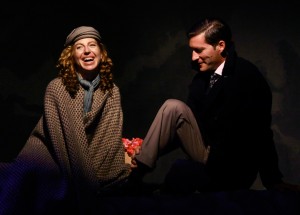Review by Peter Foldy
The setting is Poland, 1928. The play opens on an over-crowded train to Warsaw.
A handsome, sophisticated young Russian emigre called, Semyon Sapir (Mike Falkow) is invited to share a compartment with a man of the cloth, Father Alexandrov (Stephen Howard). Also on the train is a retired actress, Mme. Nadia Selmeczy (Cathy Arden) and an attractive army nurse, Katia Wampuzyk (Tanna Frederick) who is on her way to join her regiment. The conversation soon turns political and the subject of those pesky Jews quickly becomes a topic. Katia does not hide her deeply rooted antisemitism and Semyon, who we know to be Jewish, chooses not reveal that he is “one of those people” that Katia claims to be able to “smell a kilometer away.”

Despite her hatred of his race, Semyon feels a strange attraction for the young nurse and when the train stops at the beautiful ski resort town of Zakopané, a town where Katia grew up, he convinces her to disembark in order to spend a few days together before she has to continue her journey. We are not sure what Semyon’s true intentions are. Is it love at first sight, a sexual attraction, or perhaps the desire to teach the pretty young anti-semite a cruel lesson.
After a couple of beautiful, romantic days together, Semyon deflowers the virginal nurse and now he is even more torn whether to admit the truth about his religion. But soon a more devastating secret is revealed and Semyon realizes that even before they ever met, Katia had indirectly impacted his life. Again a hatred of Jews lies at the heart of the problem, and the conclusion of the play is both tragic and bitter sweet. Adding to the impact, at least for this reviewer, is the fact that the audience is left with the knowledge that in just over twelve years from when this story takes place, the Jews of Poland will be sent to extermination camps, wiping out almost three million citizens. It is certainly a sobering realization, though not everyone who sees this play will make that connection.
Written by playwright/film director/actor, Henry Jaglom and ably directed by Gary Imhoff, Train to Zakopané” is an ambitious production. The play is based on a true story told to Jaglom by his father who had a very similar experience as a young man in Poland.
Mike Falkow is well cast as “Semyon Sapir,” the suave, intelligent traveler who sets out to seduce a stranger on a train. His polite manner and dashing good looks make him at first hard to figure and for the young nurse, even harder to resist.
Tanna Frederick comes across as somewhat annoying in the role of the naive, opinionated Katia, but as her story unfolds and her weaknesses revealed, I was able to see her character’s point of view. Katia only knows what she knows, and happily believes those harmful stereo types that are reinforced as fact in certain European countries where it seems that antisemitism is taken in with mother’s milk. It was in the 1920s a fabric of their daily lives, and as history has proved, not just at the beginning of the 20th Century, but sadly to this very day.
Stephen Howard as “Father Alexandrov” and Cathy Arden as “Mme. Nadia Selmeczy” are both excellent as fellow passengers who don’t challenge Katia’s virulent opinions and who are stunned when the young nurse gets off the train with a man she has just met.
One bump in the road for “Train To ” is the language. It is thick and mannered and old world polite, but at the same time probably not inaccurate, because that is how most middle class and upper class Poles spoke in the 1920s.
Some of the delivery and mannerism, particularly from Ms. Frederick come across as as “acting” and may seem slightly over the top, but not unexpected from a character with deep insecurities who is trying to impress. As the performance moved forward, Ms. Frederick grew more grounded and easier to relate to.
Certainly, by the time we meet Jeff Elan as “Dr. Nahum Gruenbaum” and Kelly DeSarla as Katia’s old friend, “Marousia Petronko,” (both grounded and convincing) in the second act, the intentions are clearer, though certain story points are unnecessarily repeated.
Scenic design by Chris Stone is impressive, if perhaps overly ambitious, requiring lengthy set changes. Costumes by Shayna Frederick are glamorous and appropriate for the ladies and less so for the gentlemen. Dr. Grienbaum’s modern day suit and sweater especially made him look out of place.
Great music choices by the production certainly help to set the atmosphere and allow the audience relate to the era.
“Train To Zakopané – A True Story Of Hate And Love” feels in many ways like a grand motion picture from the 1940s. It’s a sweeping story of a once in a lifetime romance and also a history lesson that, even in this day and age, may not has been fully absorbed.
Despite it’s minor flaws, “Train To Zakaponé” is a charming and important production that deserves to be seen.
Edgemar Center for the Arts, Main Stage, 2437 Main Street, Santa Monica 90405. Thursday – Saturday 7:30 pm, Sunday 5 pm
(310)392-7327 or The Edgemar Center for the Arts
Tickets: $34.99
Parking in building garage $6 flat rate.
Ends: March 29, 2015




